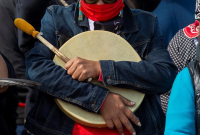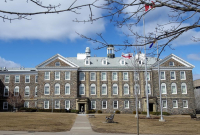DIGBY, N.S. — Prime Minister Justin Trudeau needs to do more than send tweets to settle a violent dispute over an Indigenous-led lobster fishery in Nova Scotia, a First Nations chief said Thursday.
"Actions speak louder than words," Chief Mike Sack of the Sipekne’katik First Nation told a news conference Thursday in Digby, N.S., located about 40 kilometres from where a lobster pound was damaged by protesters.
"They’re sitting in their offices, safe as can be, saying, 'We need safety out there.' Then send enforcement down," Sack said. "Do your job. Protect Canadians ... Don’t just tweet about it."
RCMP have said about 200 people were present at two violent clashes Tuesday outside lobster pounds in New Edinburgh and Middle West Pubnico.
Describing the events as a hate crime, Sack asked Trudeau to send additional law enforcement personnel to the area to ensure the violence is contained.
"This truly is systemic racism," Sack said when asked about the RCMP’s actions. "Does Trudeau care about our people? Does he care about reconciliation? They talk about it, but I don’t see any actions towards it ... The RCMP dropped the ball."
The chief said his council has decided to take legal action against those who are interfering with the band’s self-regulated lobster fishery. "We’ll go after everyone," he said, adding that his First Nation is considering calling in Indigenous warriors from across the country.
The non-Indigenous protesters say they are opposed to the band’s decision to start a commercial lobster fishing business that has operated outside the federally regulated lobster season since mid-September.
Sack argues Indigenous people in Atlantic Canada and Quebec have a treaty right to fish where and when they want, based on a 1999 Supreme Court of Canada decision that cites treaties signed by the Crown in the 1700s.
Many non-Indigenous critics, however, cite a clarification issued four months after the 1999 ruling, stating the Mi’kmaq treaty rights would be subject to federal regulations to ensure conservation of the resource.
The RCMP confirmed Thursday they had increased the number of officers in the area following the violent incidents on Tuesday night. RCMP Sgt. Andrew Joyce said he couldn’t comment on reports circulating on social media suggesting there were more confrontations in New Edinburgh late Wednesday, though he did say no arrests were made.
"What we’re hoping for is a peaceful resolution to this very important issue," Joyce said in an interview. "For me to speculate ... how long (the RCMP) will remain (in New Edinburgh), I certainly don’t want to go down that road."
In Ottawa, Minister of Indigenous Services Marc Miller said he found the images of Tuesday night’s violence alarming.
"We’re talking about a fundamental right to earn a moderate livelihood, that is a right the Mi’kmaq are entitled to exercise," Miller said. He noted that "moderate livelihood" has never been defined in a way that’s acceptable to all sides and said non-Indigenous fishers need to be involved in the discussion.
"The risk, if we don’t get this right, is that people will die ... Violence begets violence, and that is unacceptable," he said.
Meanwhile, Sack said his council opposes a plan by a Mi’kmaq activist to sell "livelihood lobster" outside the Nova Scotia legislature on Friday.
The chief said the event was not approved by the band council as part of a system for sales it is setting up, and he suggested it could derail talks with government officials.
Cheryl Maloney, a former president of the Nova Scotia Native Women’s Association, said Thursday the event would be used to draw attention to the fact that provincial regulations prevent the sale of seafood caught by people who do not hold a valid commercial fishing licence.
"This provision is unconstitutional since it excludes Mi’kmaq from selling lawfully caught fish under the Peace and Friendship Treaties of 1760-1761 and represents an infringement of their right to a livelihood, as affirmed by the Supreme Court of Canada," Maloney said in a statement.
Sack said the Mi’kmaq fishery will continue despite the damage done to the holding facilities, the burning of one of the fisher’s boats and damage to vehicles in recent weeks.
He said the band is now in the process of purchasing the damaged plant in New Edinburgh, which he said would include a buyer’s licence if the sale is completed. "It’s just a matter of doing the paperwork," he said.
There are currently 10 Mi’kmaq vessels from the band working in the moderate livelihood fishery in St. Marys Bay.
This report by The Canadian Press was first published Oct. 15, 2020.
— With files from Danielle Edwards and Michael MacDonald in Halifax





Comments
The simple test for bias is to reverse the roles in a situation and see if the reaction, outcomes and harms would be the same. so.... imagine that a mob of 200 vile swearing, pissing in your truck, gun toting(?) firebombing, rockthrowing, Mic mac surrounded a white local NS fisherman and torched his truck and rammed his boat and spread his catch all over the ground after smashing out the windows of his property and threatening his life.
Imagine the RCMP taking an hour to show up and then just standing there, letting things continue and not charging any of the Mic mad mob, let alone tazering, or arresting or violently manhandling any of the perpetrators. Imagine it happening the next night too somewhere else and their comment was:
"we need all sides (they are all good people you know) to talk about this and resolve it calmly"
Wow I bet First Nations anywhere in Canada would love it if that scenario played out for them!!!
Can you honestly imagine that happening if the roles were reversed.!!!!!! Can you imagine the Fn mob acting with impunity from NS RCMP????
That is how to understand that this is a systemic baked in response..
Good on the chief for taking names (I hope video was taken, have seen precious little on the news.)
take them to court, charge them, with destruction of property, assault, hate crimes, sue them ,get them fired. That is the only way things will change. Talk all you want afterwards. Whites to date know they can do whatever with Impunity.
Do you think that guy who murdered 22 people and bragged about his guns and assaults would have been left alone to carry on if he weren't a middle class white guy????
I am so furious at this violence being tolerated by all levels of (law abiding, rule of law don't you know) governments. BULLSHIT times ten---rule of law means nothing to you except as a weapon.
Get your ass to the port and form a protective chain ---RCMP NS
Get your ass to the port Marc Miller and confront the white mob
Get your ass to the port Premier Mc Neil and tell them to go home and wait for the arresting officers to arrive and charge them with hate crimes, criminal mischief and so on.
WTF